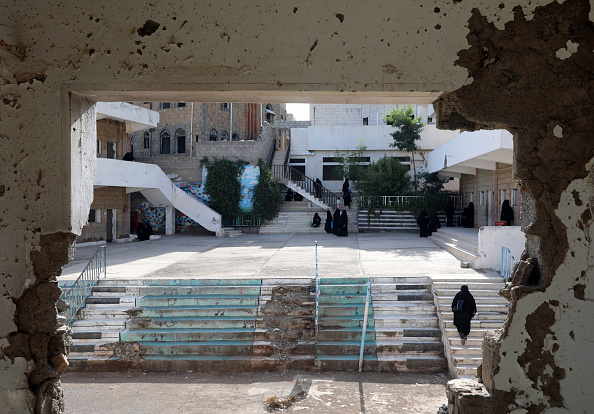Three years into Yemen’s civil war, the country continues to see severe humanitarian devastation, widespread food insecurity, and lack of economic access, against the backdrop of an increasingly complex geopolitical environment. An intensification of fighting in Hodeidah and elsewhere in the country has added to the human costs of the conflict and threatens to become catastrophic. Increasingly, Yemenis are war-weary and anxious to see progress on the UN-led negotiating process intended to end the fighting and restore the peaceful transition interrupted three years ago.
The Middle East Institute (MEI) is pleased to host a half-day conference to assess the priorities for ending the conflict and scenarios to move forward. This conference will convene two panels and a keynote address to assess urgent priorities and potential pathways forward for Yemen.
AGENDA
1:30p.m. | Welcome Remarks
Ambassador (ret.) Gerald Feierstein
Director of government relations, policy and programs, MEI
1:30-2:30pm | Yemen’s internal political and security challenges
H.E. Ambassador Ahmed Awad Bin Mubarak
Ambassador of Yemen to the United States
Sama’a al-Hamdani
Founder, Yemeniaty
Timothy Lenderking
Deputy assistant secretary, Bureau of Near Eastern affairs, U.S. Department of State
Amb. (ret.) Gerald Feierstein
Director of government relations, policy, and programs, MEI
2:30-2:45pm | Coffee Break
2:45-3:45pm | Post-conflict stabilization and reconstruction priorities
Bruce Abrams
Deputy assistant administrator, Middle East bureau, USAID
Abdulrahman al-Eryani
Independent economic development specialist
Latifa Jamel
Chairperson, Justice for Women and Children
3:45-4:00pm | Closing
SPEAKER BIOGRAPHIES
Bruce Abrams
Deputy assistant administrator, Middle East bureau, USAID
Bruce Abrams assumed duties as deputy assistant administrator in USAID’s Middle East Bureau in January 2017. His portfolio includes USAID programs in Yemen, Tunisia, Morocco, Libya, the technical support team and the Middle East Regional Platform. Abrams joined the Middle East bureau after serving as deputy mission director in USAID Zimbabwe. He has been a USAID Foreign Service Officer since 1999, having served as a Democracy, Rights and Governance Officer in Colombia (2000-03), Iraq (2004), Egypt (2004-09) and Peru (2009-13), before serving as Deputy Mission Director Zimbabwe (2013-16). In 2013, he was promoted to the senior foreign service. Prior to joining the USAID foreign service, Abrams was a U.S. Peace Corps volunteer in Hungary and a contractor with USAID Missions in Hungary and Serbia.
Sama’a al-Hamdani
Founder, Yemeniaty
Sama’a Al-Hamdani is a non-resident fellow with Sana’a Center for Strategic Studies based in Washington D.C., and a researcher and analyst focusing on Yemeni politics and women affairs. She has worked for United States Institute of Peace (USIP), and her writing has been published in Al-Monitor, the Brookings Institute’s LawFare Blog, The National, MENAsource, and the Atlantic Council, among other publications and journals. Her comments also appear regularly in media outlets including CNN International, CNN America, BBC World Service, Al Jazeera English, The Huffington Post, France 24, and NPR, among others.
H.E. Ambassador Ahmed Awad Bin Mubarak
Ambassador of Yemen to the United States
Ambassador Ahmed Awad Bin Mubarak assumed his duties as the ambassador of the Republic of Yemen to the United States in August 2015. Formerly, Ambassador Bin Mubarak was the director of the presidential office and chief of staff. Prior to taking up his appointment as the director, Ambassador Bin Mubarak was appointed on January 2013 secretary general of Yemen's National Dialogue Conference (NDC), leading a team of over 120 staff facilitating the mediation process among the participating 565 delegates, and providing technical assistance to NDC working groups. Additionally, during his tenure as the NDC secretary general, Ambassador Bin Mubarak co-chaired the steering committee of the Multi-Partner Peace Building Trust Fund. Following the successful conclusion of the NDC, Ambassador Bin Mubarak was appointed, on January 25, 2014, member and rapporteur of the Regions Committee.
Amb. (ret.) Gerald Feierstein
Director of government relations, policy, and programs, MEI
Amb. (ret.) Gerald Feierstein is director for government relations, policy and programs at MEI. He retired from the U.S. Foreign Service in May 2016 after a 41-year career with the personal rank of career minister. As a diplomat he served in nine overseas postings, including three tours of duty in Pakistan, as well as assignments in Saudi Arabia, Oman, Lebanon, Jerusalem, and Tunisia. In 2010, President Obama appointed Amb. Feierstein U.S. Ambassador to Yemen, where he served until 2013. From 2013 until his retirement, Amb. Feierstein was principal deputy assistant secretary of State for Near Eastern affairs.
Latifa Jamel
Chairperson, Justice for Women and Children
Latifa Jamel is the chairperson of Justice for Women and Children. Originally from Taiz, she is a Yemeni journalist and political activist. She served as board members in Yemen Aid, International Council of Rights and Freedoms, and Yemeni American Coalition. She previously worked as an academic advisor and head of Social Studies department in local schools within Taiz.
Timothy Lenderking
Deputy assistant secretary, Bureau of Near Eastern affairs, U.S. Department of State
Timothy Lenderking is the deputy assistant secretary of state for Arabian Gulf affairs in the Near East Bureau at the U.S. Department of State. He is a career member of the senior Foreign Service. Lenderking served previously as the deputy chief of mission at the U.S. Embassy in Riyadh, Saudi Arabia, from 2013-2016. He served as the director of the Pakistan office at the Department of State from 2010-2013. From 2008-2010, Lenderking completed two tours in Baghdad, the first as the senior democracy advisor at the US Embassy, and the second as the policy advisor to LTG Charles Jacoby, Commanding General of Multi-National Forces Iraq (MNF-I), based at Camp Victory. Before his Iraq tours, Lenderking served as the economic counselor and acting deputy chief of mission at the U.S. Embassy in Kuwait. He was also the political counselor at Embassy Rabat from 2002-2006.












